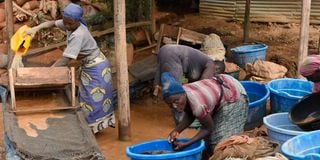State suspends gold mining citing rise in illicit activities

Artisanal miners extract gold at Masiyenze mines in Savane village in Ikolomani, Kakamega County, in mid-June.
The suspension of gold mining operations in Western region has left large-scale prospectors in the lurch, with authorities justifying the moratorium on an increase in illegal activities that are denying the government of revenue.
The region is believed to harbour huge gold deposits, estimated at 1.03 million ounces worth Sh164 billion.
But citing loss of revenue due to unlicensed operations, Western Regional Mining Officer Samwel Too declared the suspension of all mining activities across the region. Mr Too said foreign companies are prospecting for gold without proper licensing and work permits.
In Kitigu in Vihiga County, Mr Too said the unlicensed firms are posing as artisanal miners to evade paying taxes.
Mr Too further declared the area as a conflict zone following the arrest and arraignment of six Chinese nationals and the death of another in an intense battle for the precious metal.
He said the moratorium will remain in force until all miners meet the legal requirements.
The six Chinese nationals who were arraigned before the Vihiga Magistrate’s Court are Zhang Tong, Lu Qing, Lui Rui, Qui Xianping, Yao Youpeng and Wang Yongbin.
They were charged with several counts, including operating Kitigu Resource Limited, a gold processing factory, without a valid licence contrary to Section 202(1) of the Mining Act, 2016.
They were also charged with failure to apply for registration of a Personal Identification Number to the Kenya Revenue Authority’s Commission of Domestic Taxes as required under the Tax Procedures Act 2015 Sections 8(1)(a), (2) and (3) as read with Income Act Cap 470 Section 3(2)(a)(ii).
Four of the six foreigners — Tong, Qing, Rui and Xianping —faced a separate charge of being unlawfully in Kenya contrary to section 53(1)(j) of the Citizenship and Immigration Act, 2011.
The four also faced another charge of engaging in employment without a valid work permit. Senior Principal Magistrate Samson Ongeri released them on a Sh1 million bond. Mr Too said his office would liaise with other government agencies to enforce the suspension.
“The government is losing a lot of money because of illegal mining. Legitimate investors are also shying away. The illegal activities have led to disputes, which are turning violent.”
“We have to know who qualifies to be called an artisanal miner and who doesn't so that operations in the mines are devoid of conflict,” he added.
In June, Vihiga Senator Godfrey Osotsi accused National Assembly Majority Whip Mr Silvanus Osoro of vouching for unlicensed firms to rival local artisanal miners in the county.
Mr Osotsi said further accused Mr Osoro of making “undeclared visits” to mining sites in the county without the knowledge of the local administration.
Mr Osotsi vowed to ask the Senate to summon the MP and launch a probe into his alleged interference in the lucrative sector that is the main source of livelihood for locals.
He said artisanal miners, lacking the technical skills and machinery to compete with the foreign firms brought in by Mr Osoro, were losing out.
But dismissing the claims, Mr Osoro said Kenya espoused free market economics and that he was conducting legitimate business that has employed 400 youths in Vihiga County.
Mr Osoro said a Senate probe would not stop him from carrying on with his mining activities, which he said were legal. It was wrong, he added, for people to point fingers at “a genuine businessman”.
And in April, Petroleum and Mining Cabinet Secretary Salim Mvuria toured the Viyalo artisanal mining site in Sabatia Sub-county and announced plans to support the activities of the local miners.
The plans included enlisting them into cooperative societies to enable them access loan and training as well as decriminalise their activities.
Also in the plans was the establishment of Artisanal Miners Committees in line with the Mining Act, 2016 in a bid to attract budgetary allocations to cater for the welfare of small-scale gold miners.





